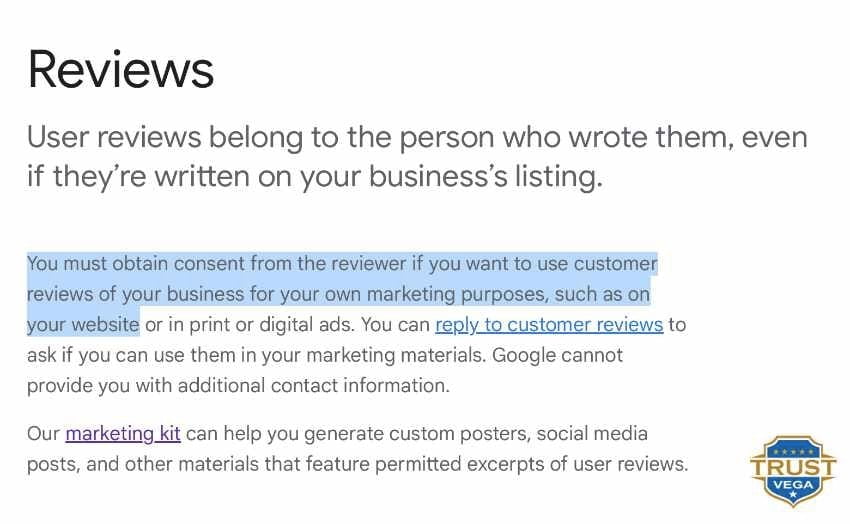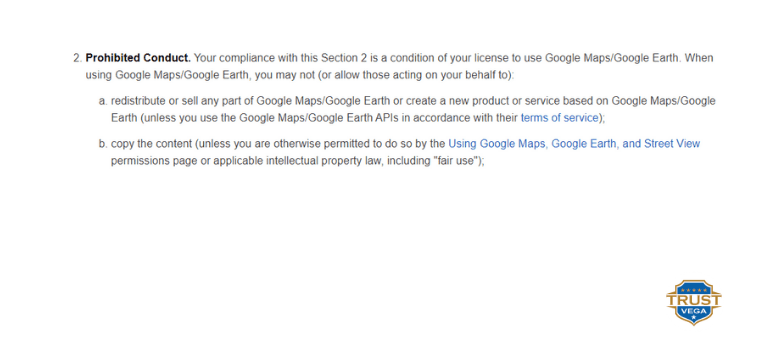You’ve probably come across this scenario: You receive a positive review from a happy customer on Google. Your immediate instinct may be to share the review on multiple platforms, including your website, to increase visibility and attract more customers.
While this may seem like a simple and effective strategy, it’s essential to understand the potential consequences of copying and pasting reviews on your website.
Many online review platforms, including Google, have strict guidelines that dictate how businesses can use and display reviews. Violating these guidelines can result in penalties such as review removal, account suspension, or even legal action.
Moreover, copying and pasting reviews can result in duplicate content, which can negatively impact your search engine rankings.
In this blog post, we’ll explore why embedding Google reviews on websites is a bad idea and what businesses should do instead.
By the end of this post, you’ll have a better understanding of how to get and use reviews on your website effectively while staying within platform guidelines.
Disclaimer: I am not a lawyer, and this is not legal or professional advice. If you are unsure after reviewing the various Google terms and small print I’ve highlighted in this article, please do consult a legal professional to ensure you don’t accidently incur the wrath of Google.
Alright, with that out of the way, let’s dive in…
Table of Contents
- Is It Legal To Use Google Reviews On My Website?
- Can I Copy And Paste Google Reviews On My Website?
- How Does Copying Google Reviews Affect Your SEO
- What Will Happen If I Don’t Follow Google Reviews Policy?
- How Can I Use Google Reviews The Right Way?
- How Does Copying Reviews Affect Your Business?
- Why Relying Solely On 3rd Party Reviews Can Hurt Your Online Reputation
- Best Practices For Marketing Your Online Reviews
- How To Proactively Collect Reviews Directly And Legally
Is It Legal To Use Google Reviews On My Website?
Yes, it is legal to use Google reviews on your website as long as you follow Google’s review content policy and terms of service.
Google has a Business Profile marketing kit, which allows businesses to create posters, ads and social media posts containing approved review snippets, and this is a legitimate way to use Google reviews on your site.
They do not, however, offer any tool to embed Google reviews on websites using a snippet of code.
There are various 3rd party plugins that add Google reviews to your website, but as we’ll discuss below, this can leave you open to legal and privacy issues.
If you do use Google Business marketing kit or a plugin to add reviews to your own website, it is important to ensure that you attribute the reviews to the original reviewer and that you do not modify or falsify the reviews in any way.
To further understand, you can take a look at Maps User Contributed Content Policy, as Google reviews fall under this and are submitted and managed through the Google Maps tool.
Additionally, Google’s guidelines state that you can only use a customer review for your own marketing purposes by obtaining explicit consent from the reviewer.

Ultimately, it is important to consider privacy and consent from both the user and Google when using Google reviews on your website.
Can I Copy And Paste Google Reviews On My Website?
Before you copy and paste Google reviews on your website, or into other marketing materials, there are two important aspects to consider: Privacy & Consent.
Firstly, reviews are protected by copyright law, which means that the person who wrote and posted the review owns the rights to it.
Using someone’s review without their permission can create legal and privacy issues for companies, especially if the review contains personally identifiable information.
The General Data Protection Regulation (GDPR) and California Consumer Privacy Act (CCPA) give customers the right to protect their personal information, which means that businesses must obtain consent before using reviews that may contain personal information.
Secondly, businesses must also obtain permission from Google before using reviews submitted to their platform.
If you use a 3rd party plugin to embed reviews from Google on your website, then you will be subject to the Google API terms of use, which actually forbids the scraping and reposting of reviews.

Thing is, it’s not the plugin author who gets in trouble for embedding Google reviews.
That’s because it’s the business owner who accepts the Google API terms of service when they connect to their Google Business listing.
And the last thing any business needs is to feel the wrath of Google for for breaching their copyright or trademark rights.
Lastly, according to Google Map’s Terms of Service, users cannot copy or redistribute content, and that includes reviews.

How Does Copying Google Reviews Affect Your SEO

Here’s the thing: When you copy and paste a Google review onto your website, you’re not actually adding anything new or valuable for your visitors.
In fact, you’re duplicating content that already exists online, which can be detrimental to your website or page’s SEO and overall online reputation.
Remember: Search engines like Google prioritize unique, high-quality content, and duplicate web content can confuse their algorithms and lead to lower search engine rankings.
Plus, if customers come across the same reviews on multiple websites, they may question the authenticity of your business and the validity of the reviews.
So, while it may seem like a quick and easy way to showcase positive reviews on your website, it’s important to take the time to create original content that adds value for your visitors and doesn’t risk harming your online presence.
That’s why we recommend collecting direct customer feedback using a tool like Trust Vega (see below for more details).
What Will Happen If I Don’t Follow Google Reviews Policy?

You may be wondering what will happen if you don’t follow Google reviews policy as a business owner. I get it. As a business owner, it’s important to know that Google takes its review guidelines seriously and has strict policies in place to maintain the integrity of its review system.
If you violate these policies, you run the risk of having your reviews removed or your business listing suspended. This can negatively impact your online reputation and your ability to attract new customers.
In addition, Google may also take legal action against you if they believe you have engaged in fraudulent or deceptive practices.
So as a business owner, it’s crucial to familiarize yourself and stay updated with Google Business Profile guidelines and ensure that you are following them at all times.
By following these guidelines, you can protect your company and online reputation and ensure that your business is in good standing with Google.
How Can I Use Google Reviews The Right Way?

The safest way for businesses to use Google reviews is to ask for permission from the reviewer and attribute the review with a proper citation, including the reviewer’s name and any other relevant details.
You should also request Google’s authorization before using Google reviews on their website or other marketing materials unless using their official marketing kit.
This ensures that the business complies with both privacy laws and Google’s policies, and avoids any legal issues that may arise from using reviews without permission.
Though, from what we understand, permission is rarely given by Google, so it’s usually safer to stick with their official marketing kit.
How Does Copying Reviews Affect Your Business?
Now, let’s say you’ve obtained permission from the reviewer to copy their review on your website. Isn’t it a great opportunity to showcase your positive reviews and build trust with potential customers?
Well, it may seem that way. However, before you go ahead with reposting reviews, it’s important to consider the possible effects.
While positive reviews can have a significant impact on sales and brand loyalty, copying or reposting third-party reviews also has some potential drawbacks.
Let’s take a look at both at the positive and negative effects of publishing and reposting reviews on your business:
Positive effects
Reposting positive reviews on your website or social media can help increase your business’s credibility.
When potential customers see that others have had positive experiences with your business, they are more likely to trust and choose your business over others.
Additionally, posting and reposting reviews also encourages customer engagement.
When customers see their reviews reposted, they are more likely to engage with your business and become repeat customers.
Negative effects
As mentioned earlier, copying reviews can lead to duplicate content, which can harm your SEO efforts.
Search engines like Google penalize websites that feature duplicate content, so it’s important to make sure that you are creating original content that adds value for your visitors.
In addition, reposting reviews can also be illegal or misleading if the reviews are outdated or no longer accurate.
So it’s important to make sure that the reviews you repost are still relevant, timely and reflective of your current business practices.
Why Relying Solely On 3rd Party Reviews Can Hurt Your Online Reputation
When you rely solely on third-party review sites (such as Google reviews, TripAdvisor, Facebook page etc), you are not in control of the information that potential customers read and see about your business.
This can hurt your online reputation because third-party sites may not accurately reflect your business or may skew towards negative reviews (looking at you, Yelp reviews).
Additionally, using these reviews on your own website creates duplicate content that can harm your website’s ranking on search engines like Google.
Another thing to keep in mind is that relying solely on third-party reviews can give the impression that your business is not actively seeking feedback from customers, which may deter some potential customers.
To avoid these issues, it’s best to actively seek out reviews from your own customers through review management software like Trust Vega – that directly asks them for feedback.
This approach will ensure that you are building a collection of authentic reviews that accurately reflect the experiences of your customers, rather than relying solely on third-party reviews.
And best of all, when you use a tool like Trust Vega to collect and publish customer reviews to your website, the legal issues disappear. That’s because customers are giving the feedback directly to you, and granting explicit consent for you to use it.
Trust Vega also gives your customers the tools they need to exercise their privacy rights under GDPR/CCPA if they ever want to change or remove their review from your website.
Best Practices For Marketing Your Online Reviews
Marketing online reviews is essential for businesses looking to attract new customers and build their reputation online.
Here are some best practices to follow:
Collect Reviews Directly

Use a review management software like Trust Vega that directly asks customers for reviews via email. This method increases the likelihood of receiving a real review from real customers.
Respond to Reviews
Responding to reviews shows that you value your customers’ feedback and are committed to providing excellent service. It also gives you an opportunity to address any negative reviews and turn a negative experience into a positive one.
Promote Reviews
Share your reviews on social media, email campaigns, and other marketing materials. This will help spread the word about your reputation and build trust with potential customers.
By following these best practices, businesses can effectively market their services through online reviews and build a strong reputation online.
How To Proactively Collect Reviews Directly And Legally
Collecting genuine, consumer written reviews is an important part of any business’s marketing strategy, as it helps to establish trust and credibility with potential customers.
However, it’s important to collect reviews in a legal and ethical way, and to ensure that you’re following guidelines set forth by review platforms like Google.
This is where Trust Vega comes in handy.
Unlike other review management tools, Trust Vega collects reviews directly from customers, and does not display third-party reviews that may not comply with Google’s guidelines.
With Trust Vega, customers can leave reviews on a business’s website AND directly on Google, ensuring that businesses are able to showcase their reputation in multiple locations.
This also ensures that all reviews are authentic and comply with Google’s guidelines for using their content. It also helps protect you from malicious fake reviews.
So if you’re looking for a way to proactively collect reviews directly and legally, consider trying out Trust Vega.
With this review management software, you can easily collect reviews for your website as well as Google Reviews.
It also ensures consent and privacy for your customers.
Customers can edit or remove their review at any time, and you can rest assured that you’re following all the necessary guidelines and regulations, such as GDPR.
Don’t wait a minute longer to start collecting valuable reviews from your customers and boosting your online reputation.
Give Trust Vega a try today and see the difference it can make for your business!

